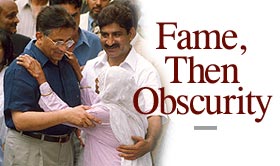Home > News > Specials
The Rediff Special/Priya Solomon
June 17, 2003

The window curtains are drawn against the torturous sun. Outside, layers of dust coat the sleepy bylanes where dogs and friendly monkeys roam freely.
This is a typical Sunday afternoon at the historical Neharwali Haveli in Old Delhi, birthplace of Pakistan President Pervez Musharraf. Come Monday and this place will throb with life once again.
General Musharraf's ancestral home has slipped back into obscurity and its residents have resumed their daily lives after their moment of glory. A part of what used to be a magnificent mansion played host to Musharraf on July 14, 2001, when he was in Delhi for the Agra Summit.
The place first came into the limelight some time after the general's military coup in Pakistan. At the height of the Indo-Pak tensions in 1999 during the Kargil conflict, he mentioned about his ancestral mansion in New Delhi.
That sent a stream of reporters there, and residents found questions they had no answers to being hurled at them.
Now, two years later, there are no media here. Politicians have found other issues to focus on and the city authorities have not bothered to check on the haveli's condition again.
"No one came here after the Musharraf visit," said Raj Kumar Jain, the only resident who stood with Indian leaders to welcome Musharraf to the haveli in 2001. "They [the authorities] just got the road built and did some cleaning around the place," he said. "After that, there has not been any development."
What used to be a mansion of 1,694 square metres before Independence has long since lost its original shape. Today it houses many legal and illegal constructions accommodating several dozen families and a market.
The most famous 'victims' of Gen Musharraf's visit to the haveli were two orphan siblings -- Ripu Daman and Zeney Pal, who used to live in a three-room apartment on the premises.
One of their rooms was levelled for widening a passage for the president and his entourage to walk through. The media focused on them and their demolished room was built back immediately.
Two families, the Jains and the Golas, claim they are the owners of the part where Gen Musharraf lived till he was four, before his family migrated to Karachi in the wake of Partition.
The dispute surfaced when Prime Minister Atal Bihari Vajpayee invited Gen Musharraf to Delhi. It took an ugly turn when the general announced he wanted to visit the haveli of which he has no memories.
The two families battled to host him. In the end, the Jains emerged victorious and their premises were shown to Musharraf and his wife Sehba as their ancestral haveli.
But what is not known is that till the night before Gen Musharraf's visit to the congested bylanes of Old Delhi, officials of the Delhi government, including a team of archaeologists and revenue officials, were struggling to ascertain where precisely the Musharraf family lived. Then, orders were issued to local officials to leave the investigations midway and accept what had already been publicised.
"We were in a dilemma as there was no concrete proof to show this was his ancestral place," an official who closely supervised the procedure told rediff.com
Thus was it decided that the Jains' part of the haveli would host the Musharrafs. "We were told to make arrangements and forget about proofs," the official said.
No discussion took place on the subject again.
Now with the Indo-Pak tensions melting, residents of this haveli hope for the spotlight to return. Reflecting that desire, the Jains have offered to make the haveli the next venue for the peace talks between the nuclear powers.
"Things seem to be moving ahead. All we can say is that our place is open for holding talks at any point of time," said Raj Jain, as his elder brother D K Jain nodded.
"We are ready to help the government in whatever manner we can," Raj continued. "And the place also holds emotional value for Musharraf."